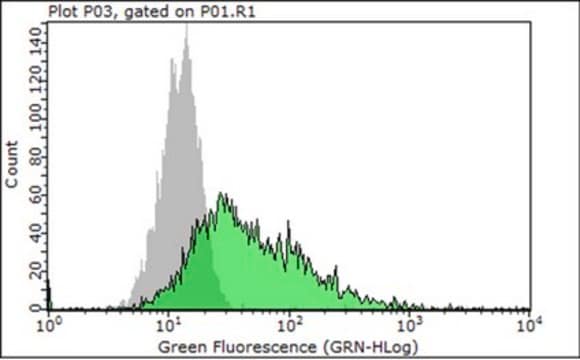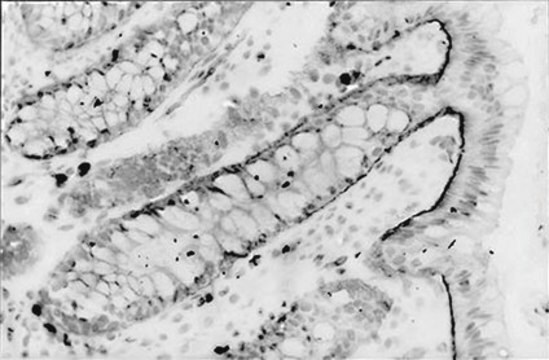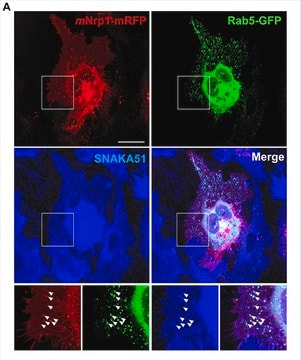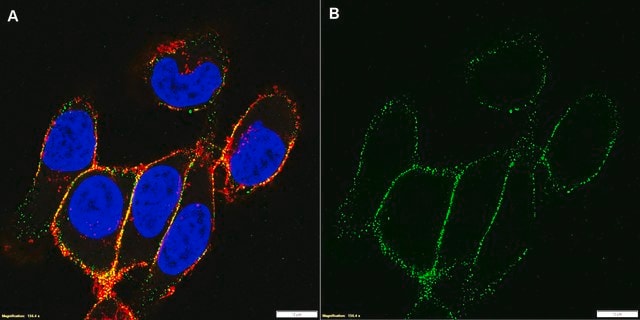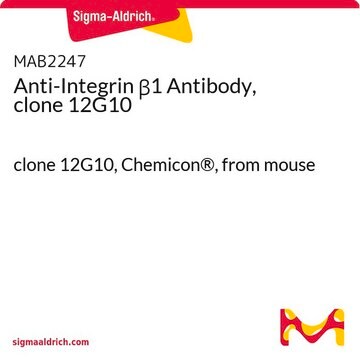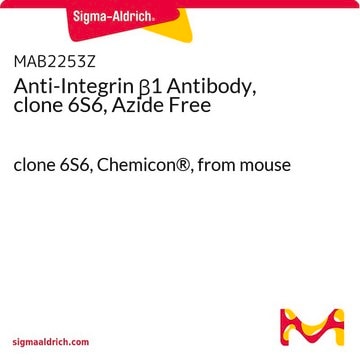MABT409
Anti-Integrin Beta1, clone AIIB2 (Azide Free) Antibody
clone AIIB2, 1 mg/mL, from rat
Sinónimos:
Integrin beta-1, Fibronectin receptor subunit beta, Glycoprotein Iia, GPIIA, VLA-4 subunit beta, CD29
About This Item
Productos recomendados
biological source
rat
Quality Level
antibody form
purified antibody
antibody product type
primary antibodies
clone
AIIB2, monoclonal
species reactivity
rhesus macaque, horse, human, pig, canine, bovine, sheep
concentration
1 mg/mL
technique(s)
activity assay: suitable
immunocytochemistry: suitable
immunohistochemistry: suitable
immunoprecipitation (IP): suitable
western blot: suitable
isotype
IgG1κ
NCBI accession no.
UniProt accession no.
shipped in
dry ice
target post-translational modification
unmodified
Gene Information
human ... ITGB1(3688)
Categorías relacionadas
General description
Immunogen
Application
Immunohistochemistry Analysis: A representative lot detected Integrin Beta1, clone AIIB2 (Azide Free) in floating villi tissue (Damsky, C. H., et al. (1992). Journal of Clinical Investigation. 89:210-222).
Immunohistochemistry Analysis: A representative lot detected Integrin Beta1, clone AIIB2 (Azide Free) in CTB aggregates that have invaded matrigel in vitro (Damsky, C. H., et al. (1994). Development. 120:3657-3666).
Immunocytochemistry Analysis: A representative lot detected Integrin Beta1, clone AIIB2 (Azide Free) in AGS cells (Hutton, M., et. al. (2010). Infection and Immunity. 78(11):4523-4531).
Immunoprecipitation Analysis: A representative lot immunoprecipitated Integrin Beta1, clone AIIB2 (Azide Free) in NP-40 cell lysate (Werb, Z., et al. (1989). JCB. 109:877-889).
Cell Structure
Adhesion (CAMs)
Quality
Western Blotting Analysis: 1.0 µg/mL of this antibody detected Integrin Beta1, clone AIIB2 (Azide Free) in 10 µg of HUVEC cell lysate.
Target description
Physical form
Storage and Stability
Handling Recommendations: Upon receipt and prior to removing the cap, centrifuge the vial and gently mix the solution. Aliquot into microcentrifuge tubes and store at -20°C. Avoid repeated freeze/thaw cycles, which may damage IgG and affect product performance.
Disclaimer
¿No encuentra el producto adecuado?
Pruebe nuestro Herramienta de selección de productos.
Optional
Storage Class
12 - Non Combustible Liquids
wgk_germany
WGK 2
flash_point_f
Not applicable
flash_point_c
Not applicable
Certificados de análisis (COA)
Busque Certificados de análisis (COA) introduciendo el número de lote del producto. Los números de lote se encuentran en la etiqueta del producto después de las palabras «Lot» o «Batch»
¿Ya tiene este producto?
Encuentre la documentación para los productos que ha comprado recientemente en la Biblioteca de documentos.
Nuestro equipo de científicos tiene experiencia en todas las áreas de investigación: Ciencias de la vida, Ciencia de los materiales, Síntesis química, Cromatografía, Analítica y muchas otras.
Póngase en contacto con el Servicio técnico